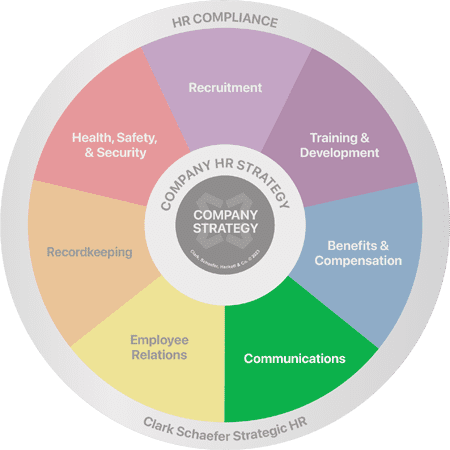Do We Need to Have a Social Media Policy? If So, What Should We Include?
Last Updated on June 18, 2020 / Communications
Question:
Do we need to have a social media policy? If so, what should we include?
Answer:
This is an important question that all companies need to consider. We cannot deny the prevalent use of social media these days. According to a recent study by Pew Research Center, seven in ten Americans (69% of the public) use some type of social media. Although young adults were early social media adopters, this study shows use by older adults has increased in recent years.
The dramatic uptick in social media use has caused many companies to leverage their own social media outlets to engage with customers and the general public. It is safe to say that the majority of your workforce is actively using social media as well.
Determining whether your company needs a social media policy or how you should structure the policy can depend on your company culture, work environment, company branding, and the nature of your business. It’s worth noting that the popularity and frequent use of social media is going to be around for the foreseeable future. All it takes is one misstep by your company or an employee to find yourselves in a public relations fiasco that could damage your brand or company reputation. Are you prepared?
What is a Social Media Policy?
A social media policy is a set of guidelines that explain your company’s expectations of how the company and its employees should conduct themselves and represent the company online.
Because social media can blur the lines between personal life and work life, many companies have developed a related policy to protect their brand and company reputation online. It can also be used to clarify how their company’s code of ethics and business conduct also apply to content on social media.
What should you include in a Social Media Policy?
There are different ways to approach developing a social media policy, so you’ll want to consider your intended outcome. Here are some things to consider addressing in your policy:
- Usage and Accounts: What are your expectations of use during work hours? Can employees use company equipment (computers, mobile phones, tablets), company email accounts, duplicate company passwords?
- Company Representation: Who can officially speak on behalf of the company? How should employees handle situations when commenting on anything related to your organization? (This also presents an opportunity to guide interested employees on how to be effective brand ambassadors and to tout the great features of your company and products.)
- Confidentiality/Privacy: Clarify what types of company information should not be shared (i.e., trade secrets, financial data, company product plans, client information, etc.)
- Conduct Standards: Clarify how your company’s code of conduct, ethics standards, and harassment policies apply.
- Consequences of Breaking Policy: What steps will be taken if employees don’t adhere to the guidelines of the policy?
Use caution before taking disciplinary action against an employee’s use of social media. As the National Labor Standards Board (NLSB) explains, “The National Labor Relations Act [NLRA] protects the rights of employees to act together to address conditions at work, with or without a union. This protection extends to certain work-related conversations conducted on social media, such as Facebook and Twitter.” As the NLSB is charged with enforcing the NLRA, it will be helpful for you to be aware of how they have handled social media related cases.
Social Media Policy Resources
There are several resources available to help you in developing a social media policy, but these two may be a good place to start:
- Hootsuite Blog Article – In addition to providing an overview of different components to consider including in your policy, this article also has links to social media policies from several different organizations ranging from large corporations, health care, government, journalism, and higher education institutions.
- Society for Human Resource Management (SHRM) Sample Policy – Provides a sample policy that was ruled lawful by theNLRB in a May 2012 Operations Management Memo.
Conclusion
If you have any doubt whether your employees understand and will meet your expectations on how they should represent your company or the impact that their online behavior can have on your organization, then you should consider developing a social media policy. You should also have a communication plan to ensure that your employees understand the policy and have an opportunity to ask questions. Keep in mind that social media outlets will continue to grow and evolve over time, so remember to revisit and revise your policy as the social media landscape changes.
Do you need help with communications? Do you need policies and procedures or job descriptions written? Thinking about starting a company newsletter or needing to create recruitment materials? Strategic HR can help. Visit our Communications page to learn more.




